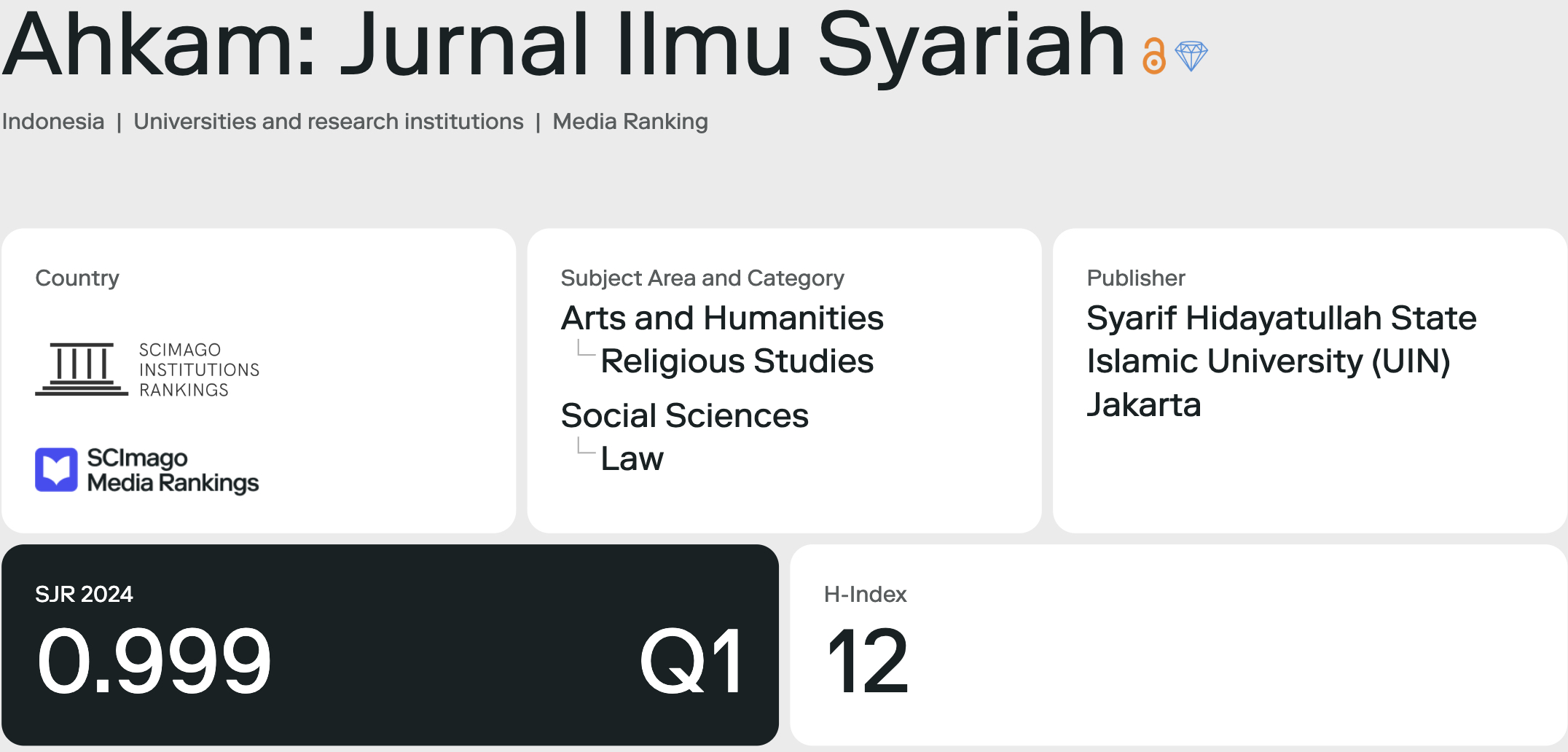Public Chaos: Alleged Fatwa on Boycotting and the Fear of Missing Out on Israeli Products in Indonesia
DOI:
https://doi.org/10.15408/ajis.v25i1.41588Keywords:
Fatwa, Public Chaos, Israeli, Indonesian.Abstract
The following text presents a synopsis of the abstract. As the conflict between Israel and Palestine intensifies, the Indonesian Ulama Council (MUI) has issued a fatwa that has generated controversy in various mass media, particularly on social media platforms. The objective of this study is to examine whether the "fatwa" issued by the Indonesian Ulama Council (MUI) constitutes a legitimate threat against Israeli products or a misinterpretation of the fatwa within the community. The research method employed is qualitative, with a descriptive-analytical approach. The secondary data set comprises social media platforms, including Instagram, Twitter, and YouTube, as well as websites relevant to the author's research. The primary data was obtained through interviews with various stakeholders, including consumers, MUI members, pro-Palestinian activists, and digital communication experts. The results indicated that misinterpretations of the fatwa led to public disorder, characterized by ambiguity in public perception, social pressures encouraging boycott conformity, and exacerbated consumer confusion due to digital misinformation. This research highlights the importance of religious literacy and the need to establish information authority within the digital landscape.
Abstrak
Seiring memanasnya konflik antara Israel dan Palestina, Majelis Ulama Indonesia (MUI) mengeluarkan fatwa yang menuai kontroversi di berbagai media massa, khususnya media sosial. Tujuan penelitian ini adalah untuk mengkaji apakah fatwa yang dikeluarkan oleh Majelis Ulama Indonesia (MUI) tersebut hanya sekadar ancaman bebas terhadap produk Israel atau merupakan kesalahpahaman terhadap fatwa tersebut di tengah masyarakat. Metode penelitian yang digunakan adalah kualitatif dengan pendekatan deskriptif-analitis; data sekunder meliputi media sosial seperti Instagram, Twitter, YouTube, dan situs web yang terkait dengan penelitian penulis; dan data primer diperoleh melalui wawancara dengan berbagai pemangku kepentingan, meliputi konsumen, anggota MUI, aktivis pro-Palestina, dan pakar komunikasi digital. Hasil penelitian menunjukkan bahwa terjadi kesalahpahaman mengenai fatwa yang menimbulkan kekacauan di ruang publik, yang berujung pada ambiguitas persepsi publik terhadap fatwa tersebut, tekanan sosial yang mendorong konformitas dalam aksi boikot, serta peran misinformasi digital yang memperparah kebingungan konsumen. Penelitian ini menyoroti pentingnya literasi agama dan penguatan otoritas informasi dalam konteks digital.
References
Book:
Akbar, A. (2012). Metode Ijtihad Yusuf Al-Qardhawi dalam Fatawa Mu’ashirah. Jurnal Ushuluddin, 18(1), 1–20.
Akbari, M., Seydavi, M., Palmieri, S., Mansueto, G., Caselli, G., & Spada, M. M. (2021). Fear of missing out (FoMO) and internet use: A comprehensive systematic review and meta-analysis. In Journal of Behavioral Addictions (Vol. 10, Issue 4). https://doi.org/10.1556/2006.2021.00083
Al-Hamdi, A. Q. S. (1982). Fiqh Al-Islam (Juz. VI). Muthaba’ ar-Rasyid.
Alfina, Hartini, S., & Mardhiyah, D. (2023). FOMO related consumer behaviour in marketing context: A systematic literature review. In Cogent Business and Management (Vol. 10, Issue 3). https://doi.org/10.1080/23311975.2023.2250033
Altaher, M. H. (2020). Fatwa (Religious Opinion) Chaos and Ways to Address It. 9(9), 686–690. https://doi.org/10.21275/SR20912132925
Alutaybi, A., Al-Thani, D., McAlaney, J., & Ali, R. (2020). Combating fear of missing out (Fomo) on social media: The fomo-r method. International Journal of Environmental Research and Public Health, 17(17). https://doi.org/10.3390/ijerph17176128
Annur, C. M. (2023). Ada 14,5 Juta Warga Palestina Pertengahan 2023, Ini Sebarannya. 11 Oktober. https://databoks.katadata.co.id/datapublish/2023/10/11/ada-145-juta-warga-palestina-pertengahan-2023-ini-sebarannya
As-Sufyani, A. (1988). ats-Tsabat wa Syumul fi Asy-Syari’ah al-Islamiyyah. Makhtabah Syamilah.
Bloom, N., & Reenen, J. Van. (2013). Memori dan Trauma dalam Hubungan Internasional: Dukungan Austria Terhadap Israel dalam Melawan Aksi Boikot, Divestasi, dan Sanksi (BDS). NBER Working Papers, 8, 89. http://www.nber.org/papers/w16019
Dictionary, U. (2023). Israeled. 22 Oktober. https://www.urbandictionary.com/define.php?term=Israeled
Dou, F., Li, Q., Li, X., Li, Q., & Wang, M. (2023). Impact of perceived social support on fear of missing out (FoMO): A moderated mediation model. Current Psychology, 42(1). https://doi.org/10.1007/s12144-021-01404-4
Fakhriansyah, M. (2023). Fakta, Aksi Boikot Produk Israel Dibuat Warga Israel Sendiri. 20 Oktober. https://www.cnbcindonesia.com/entrepreneur/20231019094338-25-481842/fakta-aksi-boikot-produk-israel-dibuat-warga-israel-sendiri
Indiraphasa, N. S. (2023). Soal Boikot Produk Israel, Akademisi Jelaskan Pengaruh Fatwa MUI ke Masyarakat. 21 November. https://www.nu.or.id/nasional/soal-boikot-produk-israel-akademisi-jelaskan-pengaruh-fatwa-mui-ke-masyarakat-NxCpL#google_vignette
Indonesia, C. (2023). Perang Hamas dan Israel. https://www.cnnindonesia.com/internasional/20231030101022-120-1017558/updateperang-hamas-vs-israel-9521-orang-tewas-gaza-makin-sekarat%0A
Intan, N. (2023). Heboh Aksi Boikot Israel, Masyarakat Indonesia Hanya FOMO? 05 November. https://ameera.republika.co.id/berita/s3n5zp478/heboh-aksi-boikot-israel-masyarakat-indonesia-hanya-fomo
Khalaf, A. H. (2016). Comment on Possamai, Turner, Roose, Dagistanli and Voyce/2. : The “fatwa” chaos, the multiplication of competent authorities, and the state. 01 Januari. https://www.soc.lu.se/en/abdulhadi-khalaf/publication/e33cb3a9-051c-40fa-8e44-41f66b0a79b3
Laili, A. (2023). ANALISIS HUKUM EKONOMI SYARI’AH TERHADAP PEMBOIKOTAN PRODUK ISRAEL. EKSYA, 2(2), 152–171.
Mao, J., & Zhang, B. (2023). Differential Effects of Active Social Media Use on General Trait and Online-Specific State-FoMO: Moderating Effects of Passive Social Media Use. Psychology Research and Behavior Management, 16. https://doi.org/10.2147/PRBM.S404063
Mentari, C. I., Wahyuni, F., Rahmadani, P., & Rindiani, W. A. (2023). DAMPAK POSITIF BOIKOT PRODUK ASING BAGI PERTUMBUHAN PRODUK LOKAL (INDONESIA). 2(1).
MUI. (2023). Fatwa Majelis Ulama Indonesia No.83 Tahun 2023 Tentang Hukum Dukungan Terhadap Perjuangan Palestina. In Https://Mui.or.Id/. https://mui.or.id/baca/berita/keluarkan-fatwa-terbaru-mui-imbau-umat-islam-berhenti-konsumsi-produk-perusahaan-pendukung-israel
Negm, I. (2019). Fatwa On the Cusp of Global Awareness. 14 Desember. https://mfaegypt.org/2019/12/14/fatwa-on-the-cusp-of-global-awareness/
News, A. (2010). Fatwa fight rages between Saudi clerics. 01 July. https://english.alarabiya.net/articles/2010%2F07%2F01%2F112770
Plus, A. jazeera. (2021). “This Is Not Clashes”: This Palestinian Is Sick Of Western Media”. https://youtu.be/RPeN0HYIu1c.
Purwantini, A. H., & Anisa, F. (2019). Analisis Penggunaan Media Sosial Bagi UKM dan Dampaknya Terhadap Kinerja. 304–314.
Rahman, W. A. (2017). Egyptian Parliamentary Action against ‘Fatwa Chaos.’ 11 Maret. https://eng-archive.aawsat.com/waleed-abdul-rahman/news-middle-east/egyptian-parliamentary-action-fatwa-chaos
Rahmani, A. N. (2023). DAMPAK PERANG ISRAEL-HAMAS TERHADAP HARGA SAHAM DAN MINAT BELI MASYARAKAT PRODUK PENDUKUNG ISRAEL. 14(2), 1444–1456.
REFENDY, R. R. (2016). Analisis Hukum Islam Terhadap Pemboikotan Produk Asing Di Indonesia.
Rights, H. (2017). Palestine: Reform Restrictive Cybercrime Law. 20 Desember. https://www.hrw.org/news/2017/12/20/palestinereform-restrictive-cybercrime-law.%0A%0A%0A
Rochmah, F., Machmud, A., Mufid, M. A., & Kuswoyo, N. A. (2023). ANALISIS PENGARUH MEDIA SOSIAL TERHADAP GERAKAN BOIKOT PRODUK ISRAEL DI INDONESIA. 01(4), 23–40. https://tafsirweb.com/99011-surat-al-qalam-ayat-4.html
Safitri, S. P. (2024). Memahami Alasan di Balik Boikot Produk Israel, Biar Gak Fomo! 5 Juni. https://rahma.id/memahami-alasan-di-balik-boikot-produk-israel-biar-gak-fomo/
Sarwindaningrum, I. (2023). Korban Tewas di Gaza Tembus 20.000 Jiwa, Gencatan Senjata Masih Alot. 21 Desember. https://www.kompas.id/baca/internasional/2023/12/21/korban-tewas-di-gaza-tembus-20000-jiwa-gencatan-senjata-masih-alot
Supriyanto, N. S., Pratiwi, M. I., Kamilah, F., & Hidayat, Z. (2022). the Resistance of Social Media Activists in the Struggle for Freedom of Expression on Instagram Towards Israel’S Occupation in Palestine. Journal of Theoretical and Applied Information Technology, 100(22), 6576–6590.
United Nation. (2023). Resolusi Majelis Umum PBB. https://news.un.org/en/story/2023/10/1142932
Zulkarnain, F., Nurdin, A. A., Gojali, N., & Wahyu, F. P. (2020). Kebijakan Fatwa MUI Meliburkan Shalat Jumat Pada Masa Darurat Covid-19. Uinsgd, 1–11. http://digilib.uinsgd.ac.id/id/eprint/30733
Refendy, Ricky Rian. “Analisis Hukum Islam Terhadap Pemboikotan Produk Asing Di Indonesia,” 2016.
Downloads
Published
Issue
Section
License
Copyright (c) 2025 Nurul Husna, Risatul kautsari, Andi Farahdhiba Irfan

This work is licensed under a Creative Commons Attribution-ShareAlike 4.0 International License.








